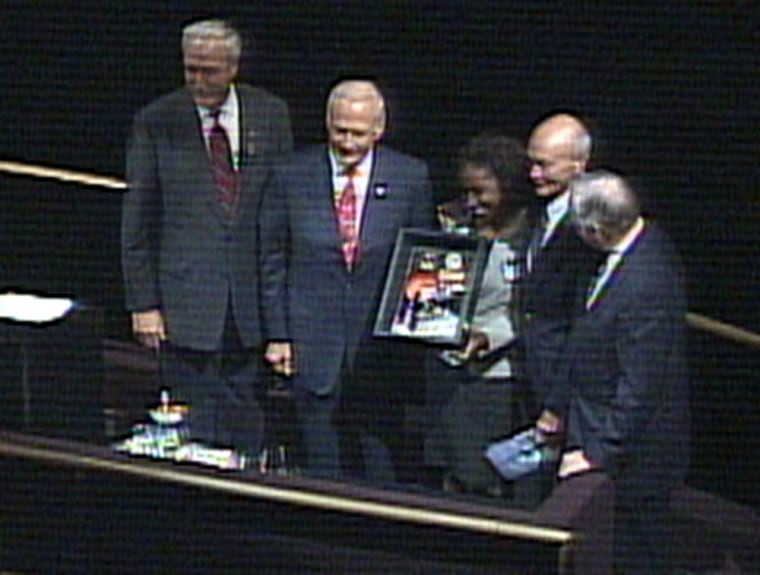Apollo 11's three crew members shared center stage once again Tuesday, using the 35th anniversary of the first manned moon landing to call on the next generation to take on new challenges on Earth and beyond.
Neil Armstrong, Buzz Aldrin and Michael Collins were the guests of honor at Tuesday's ceremony at the National Air and Space Museum in Washington — an event at which they received accolades from NASA Administrator Sean O'Keefe as well as the American and Russian residents of the international space station.
In his remarks, the 73-year-old Armstrong observed that the race to the moon may have helped keep the Cold War of the 1960s from heating up. He said the space effort served as a diversion in the sense that it allowed the United States as well as the Soviet Union to "take the high road, with the objective of science and learning and exploration."
"Eventually, it provided a mechanism for engendering cooperation among former adversaries, and in that sense it was an exceptional national investment," he said.
Backing for space vision
Armstrong voiced support for the new vision for space exploration put forth by President Bush in January. The plan calls for retiring the space shuttle by 2010, developing new spaceships to bring Americans back to the moon by 2020, and eventually pressing on to Mars and beyond.
Coincidentally, a House Appropriations subcommittee trimmed back Bush's budget request for the space vision on the Apollo 11 anniversary, just hours before the ceremony.
Armstrong argued that the vision for space exploration was meant to "reinvigorate the exploratory nature of Americans, that has served us so well throughout our history."
Aldrin, 74, who followed Armstrong onto the lunar surface 35 years ago, also backed the new space vision, saying it was "just what is required to inspire the next generation of technology pioneers, innovators and entrepreneurs to create new technologies, jobs and industries — a generation that will ensure a robust economy and America's leadership throughout the 21st century."
"Now let us roll up our sleeves and work with the administration and NASA to make this vision a reality," he told the crowd.
Preserving the earth
Collins, who manned Apollo 11's orbiting command module while his two crewmates explored the surface, took a different tack in his remarks. The 73-year-old former astronaut is now a nature photographer, and he noted sadly that global environmental conditions "are getting worse."
"Every day we pour hundreds of tons of detritus into our oceans, and the oceans are objecting," he said. "Corals are dying. Fish are disappearing."
Often, he said, the debate over space exploration and earthly needs is framed as an either/or choice: "Either fly off somewhere, or take care of our home base."
"This makes no sense," Collins observed. "We should have the sagacity to do both, because we certainly have the capacity, if not the will. How to keep alive the spirit of Apollo, the spirit of exploration and wonder, while also taking proper care of our home planet: That is the challenge of the 21st century."
Retired television anchor Walter Cronkite also was recognized as an "Ambassador of Exploration," in recognition of his reporting on the early space effort. The 87-year-old told the audience that he accepted the honor as a representative of all the journalists from that era, and argued that future generations would remember the moon landing long after many other milestones were forgotten.
"Five hundred years from now, the one date in our century that they are going to remember is July 20," he said.
'We went to the moon with slide rules'
The date was also noted at other NASA centers around the country. At Johnson Space Center in Houston, veterans reflected on the achievements of the past and the challenges of the present.
“I stared up at the moon and couldn’t believe what we had just done,” Johnson Space Center’s chief engineer, Jay Greene, said as celebrants browsed mock-ups of the moon’s surface, souvenirs from the mission and newspaper articles from 1969.
“We went to the moon with slide rules,” retiree Norman Chaffee, who worked on the spacecraft propulsion system, told the Associated Press. “I didn’t even have my first full-function calculator until 1972."
Chaffee also recalled the more freewheeling times of a less bureaucratic space program. "People generally felt like if it made sense, go ahead and do it. ... Now with the Challenger accident and the Columbia accident and some of the other things, we have become so risk-averse that we don’t dare do things,” he said, adding: “The key is to take responsible risks.”
Randy Stone, deputy director of the Johnson Space Center, said many things made the Apollo era easier than today for space projects. “We were in the Cold War,” he told AP. “We were in a technological race that most people believed we could not afford to lose.
“The naysayers didn’t have as much influence,” Stone said. “It was still hard to get money, but it wasn’t near as hard as it is today.”
